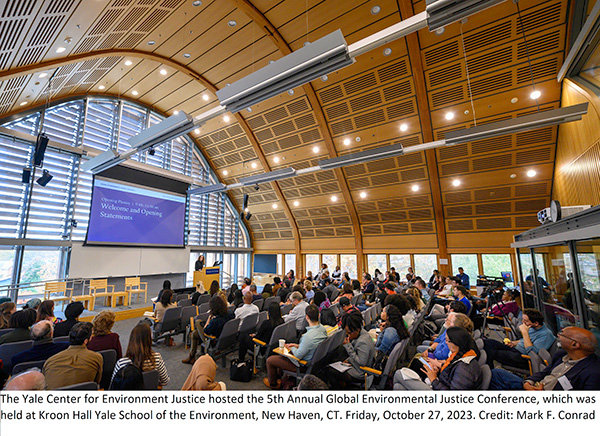ISPS Supports Conferences on Important Social and Public Policy Issues

The concept of joy might not necessarily come up a lot in government work — particularly work focused on challenging issues such as the environment. But maybe it should.
“Perhaps embracing the idea of joy in this work — especially when the work is most difficult and frustrating and even heartbreaking — is a kind of active resistance,” said Sarah Sladen, agency youth coordinator for the U.S. Agency for International Development (USAID). “It is to resist against despair and inaction and cynicism and maybe even bureaucracy. When we prioritize these issues, when you think about joy in our policies, in our strategies — when we set about doing the hard work that we need to do to bring these efforts to life — the collective results can be profound.”
Sladen delivered these remarks at the introductory session of Environmental Joy, the fifth annual Global Environmental Justice Conference organized and hosted by the Yale Center for Environmental Justice (YCEJ) at the Yale School of the Environment in October.
“For me, embracing joy is to honor young people who have the right to a healthy planet and then continue to demand better from those of us in leadership and decision-making roles,” she said.
The Institution for Social and Policy Studies joined many groups inside and outside of Yale in sponsoring the event, part of ISPS’s commitment to support conferences on important social and public policy issues.
“At ISPS, we strive to understand critical challenges in the world and help devise practical solutions to advance social welfare,” said ISPS Director Alan Gerber, Sterling Professor of Political Science. “We were thrilled to support the Environmental Joy conference, which provided a unique opportunity to assemble people working at the front lines of the fight to protect our planet and our neighborhoods by examining and elevating vital environmental and climate justice practices.”
In addition to the Environmental Joy conference and ISPS’s own conferences and events, ISPS has authorized funding in this year’s grant cycle to help support six other planned conferences outside of ISPS.
The Economic Growth Center will host “Charting the Future of Economics, Governance, and Economic Development in the United States and Beyond” in April to examine the future direction of multidisciplinary research in history, economics, and public policy on questions influenced by studies published by Naomi Lamoreaux, Stanley B. Resor Professor Emeritus of Economics and History at Yale.
Also in April, Daniel Karell, assistant professor of sociology, will co-host a workshop on “Generative Artificial Intelligence & Sociology” at Yale with Thomas Davidson, an assistant professor of sociology at Rutgers University. The event will convene social scientists interested exploring the use of generative AI in their work.
ISPS faculty fellow Hélène Landemore and Theophile Penigaud de Mourgues, a postdoctoral associate with ISPS’s Democratic Innovations program, are planning “Beyond Reason: Rethinking Democratic Deliberation in an Era of Polarization.” This June conference aims to offer a better assessment of the effect of public deliberation on political preferences and judgment that can eventually guide institutional design for such citizens’ assemblies.
Daniel HoSang, professor of ethnicity, race, and migration and American studies, is organizing “The Politics of the Multiracial Right” for September. This conference will examine the shifting racial dynamics in conservative political formations.
Amit Khandelwhal, Dong-Soo Hahn Professor of Global Affairs and Economics, will host “Synthesizing New Work in Trade and Development” at the Jackson School of Global Affairs to update the review of research on how participation in global markets affects developing countries.
And Grace Kao, IBM Professor of Sociology and professor of ethnicity, race, and migration, is planning “K-Pop: Musical Production and Consumption.” This conference will gather scholars in the social sciences and humanities who either have expertise on the globally popular Korean music known as K-Pop or have innovative ideas about analyzing data related to this phenomenon.
ISPS also provides funding for field experiments and survey research in the social sciences and plans to invite another round of conference proposals in the spring.
“ISPS prioritizes multidisciplinary engagement with questions and themes that span multiple disciplines or schools,” Gerber said. “We are proud and eager to help our colleagues convene experts to better understand the issues that shape our world.”